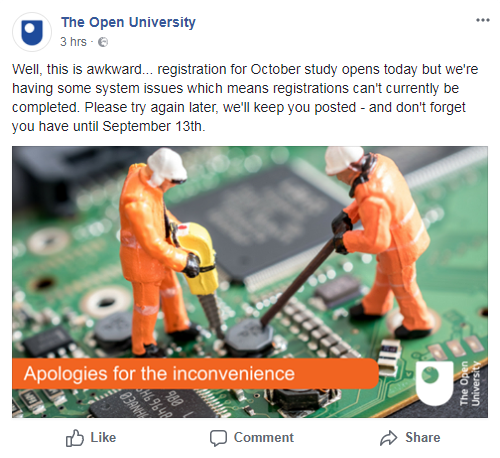At the last tutorial I went to, we received an update on the Stage 2 modules for Q62 (and Q67) which are being retired within the next few years. Some changes are excitingly small, and others are large enough to make me change my plans.
Probably the biggest news is what isn’t changing. M250 – Object Oriented Java Programming is almost certainly being replaced with another Java module, and might even still be called M250. This is good news for me, because I was worried after taking the Learn to Code for Data Analysis MOOC on OpenLearn and the news that TM112 included Python that a new Python module would be replacing M250. I don’t care one way or the other if they teach using Python or Java, object-oriented is object-oriented to me at this point, and the skills seem fairly transferable. But I’d prefer to have a more mature module than a complete tear-down which would be required by switching to Python. Hopefully they’ll be able to preserve quite a bit of the existing material and give it a good update in the process.
The largest change is probably happening to the Networking path for Q62. T216 currently takes 50% of the Stage 2 modules, and is reportedly very difficult. There are so many great things to study at Stage 2 that I had recently made the decision that I just couldn’t justify the full 60 credits required for it, and so was going to take four programming and developer based modules, instead, and just certify in networking on my own time.
That’s no longer necessary. T216 is being split into two 30 credit modules, with the first half being taught in Stage 2, and the second half in Stage 3. Given the effort level reportedly required, this seems like a good idea. Most importantly, it makes the networking path much more flexible.
It’s not the only module being shrunk, though. T215, which was the only other 60 credit module in Stage 2, is also becoming a 30 credit module. The other 30 credits aren’t be replaced, however, as there was apparently a lot of redundancy already with an existing Stage 3 module. This updates the module and removes the redundancy.
Another largish change is that a new TM254 – Software Engineering module is being introduced. (Final module code is pending … And everything else, really.) This includes parts of both M256 and M258, and I imagine replaces both of them … But I’m not entirely clear on this last part.
So here’s the summary of changes:
Stage 1:
TU100 My digital life – Final presentation being taught now, being replaced by TM111 Introduction to computing and information technology 1 (30 credits) and TM112 Introduction to computing and information technology 2 (30 credits)
Stage 2:
M250 Object-oriented Java programming – Final presentation October 2017, replacement also probably M250, or another Java module
T215 Communication and information technologies – Final presentation October 2017, replacement an unnamed 30 credit module
T216 Cisco networking (CCNA) – Final presentation October 2017, replacement TM257 at Stage 2, and TM357 at Stage 3
M256 Software development with Java – Final presentation February 2018, full or partial replacement by TM254 Software engineering
M258 IT project and service management – Final presentation October 2018, full or partial replacement by TM254 Software engineering
Stage 3:
Currently unknown, aside from the addition of TM357 as the second half of the Cisco networking module.
As I’ve said, all this will change my plans. I had been expecting to take M250, M269, M256 and TT284 (Web technologies, which I think is also just going to be refreshed similar to M250) at Stage 2, and self studying the CCNA. Now I think I’d like to take M250, M269, TM254 and TM257. Stage 3 is nearly half a decade away at this point, so I’m not going to worry about it just now.
Completely unrelated, I’ve got my TMA04 submitted. The topics covered are statistical analysis, creating graphs, determining averages, personal/professional development planning, loops and lists in Sense, and report research & writing. And probably also referencing.
In US terms, I’d give my report all of a solid C-, but that’s difficult to translate into the OU model. I also intentionally broke the rules for the PDP section, as I’m not going to lie and pretend the ticky-box method of self reflection is useful for me, so I expect to lose a huge chunk of points for that, but it’s only worth 10 marks anyway.
If it were me grading, I’d take 10 marks off my report, 5 marks off my PDP, none off the Sense stuff, and I’ve probably forgotten 2 marks worth of stuff on the statistical analysis. Additionally, my tutor seems to take points off the 20 skills marks in direct proportion to marks taken off the rest of the assessment, so that’s another 2 marks off. All together, I’d score me an 81 on this one. It makes me wonder how badly I’d have to do in order to fail an assessment.
Edit 2017/2/24: TMA04 results came back last week. Somehow I scored another 100%. I can’t really say that this is good news, though, because it highlights how vastly different my expectations are from my tutor’s expectations. I can’t truly calibrate my expectations with the OU’s until the EMA comes back, but it seems as though there needs to be a large shift.
Edit 2017/4/3: T216 module descriptions now indicate that T216 is being split into TM257 and TM258, both at Stage 2. As networking once again requires half of the Stage 2 modules, there’s no flexibility to it, and frankly no point to me taking it. Books off eBay it is!
Edit 2017/8/29: T216’s replacement is now showing as Stage2/Stage3 again. TM257 and TM357. Boy do they like change!
